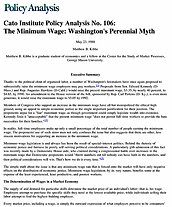Thanks to the political clout of organized labor, a number of Washington’s lawmakers have once again proposed to substantially raise the minimum wage employers may pay workers.[1] Proposals from Sen. Edward Kennedy (D‑Mass.) and Rep. Augustus Hawkins (D‑Calif.) would raise the present minimum wage, $3.35, by nearly 40 percent, to $4.65, by 1990. An amendment to the House version of the bill, sponsored by Rep. Carl Perkins (D- Ky.), is even more generous; it would raise the minimum wage to $5.05 by 1992.
Members of Congress who support an increase in the minimum wage have all but monopolized the ethical high ground, using an appeal to simple economic justice as the single important justification for their position. The proponents argue for a “fair” minimum wage, as though government could simply legislate wealth into existence. Kennedy finds it “unacceptable” that the present minimum wage “does not permit full-time workers to provide the bare necessities for their families.”[2]
In reality, full-time employees make up only a small percentage of the total number of people earning the minimum wage. The proponents’ use of such straw men not only confuses the issue but also suggests that there are other, less sincere motivations for supporting an increase in the minimum wage.
Minimum-wage legislation is and always has been the result of special-interest politics. Behind the rhetoric of economic justice and fairness lie purely self-serving political considerations. A particularly glib admission of this fact was recently made by a Democratic House aide, who claimed during a congressional battle over increases in the minimum wage that Democratic proponents would “throw numbers out till nobody can have faith in the numbers, and then political considerations will win. That’s how we do it every time.”[3]
The simple truth about the issue is that any minimum-wage rate that is forced onto the market will have only negative effects on the distribution of economic justice. Minimum-wage legislation, by its very nature, benefits some at the expense of the least experienced, least productive, and poorest workers.
About the Author

This work is licensed under a Creative Commons Attribution-NonCommercial-ShareAlike 4.0 International License.
